- Home
- Brand, Max
Silvertip's Strike Page 9
Silvertip's Strike Read online
Page 9
He could see that valley. Yes, and now he thought that he could see Silver, far away. A moment later, he was certain. He could not spot man and horse so well, but he was sure of the shadows which they cast on the ground.
Now, as he watched, the man mounted, and began to move straight up the slope toward him. Relief in a warm wave swept through the body and the brain of Dan Farrel. To be alone on such a night was terrible, but to be with such a man as Jim Silver would be exciting, almost glorious, perhaps.
He knew, as he stared down at the climbing form, that he had made no mistake — that he would never regret having ridden out on this night to fight for the herd. Then he thought of Esther and how she had let him go, willingly enough. People like Esther, he felt, always are right. They know how to pick between the easy way and the way of honor and duty and just pride.
After that, he muttered aloud: “Good old Jim Silver.”
Something jammed into the small of his back as he stood shaking his head with a new-found affection.
“Yeah,” said the voice of Delgas. “He’ll be good and old, before very long. Come here, Red. Fan this bird and get his guns. We’re goin’ to be a reception committee, son. Because that’s Jim Silver that’s climbin’ his horse up the way!”
CHAPTER XV
THE AMBUSH
Farrel was backed up from the edge of the little plateau. If they could see Silver, it was just possible that Silver might be able to spot them. Red stood in front of Farrel and laughed.
“What a simp you are, Danny!” said he. “Why didn’t you turn around and look behind you, a couple of times?”
It was strange to Farrel that he felt neither fear nor shame. There had been only a blinding moment of terror when the voice first spoke behind him, but now he could look steadily into the eyes of Red. He had always known the fellow was little good.
“I’m not clever at this sort of work,” said Farrel. “I’ve never spent much time with crooks.”
Red had just taken Farrel’s Colt. Now he laid the barrel suddenly along the head of Farrel and knocked him staggering.
“Quit that, you fool!” exclaimed Delgas. “We don’t want any noise up here. The first thing you know, Silver will hear something. He’s got ears like a cat. That’s what he is — a cat!”
Delgas was tying the hands of Farrel behind his back. Red, tying a double knot in a big silk bandanna that he folded across, suddenly thrust it between the teeth of Farrel. It made an efficient gag.
“He won’t do any yelling to warn Silver. Not just now,” said Red.
“Good work,” answered Delgas. “You’ve got a brain, kid. We can use you, maybe — Rutherford and me.”
“Jake with me,” answered Red. “You know how it is. There ain’t any use in punching cows. Ever seen an old cow-puncher? What becomes of ’em, then? They fade away, I tell you.”
“They do,” agreed Delgas. “The way of it is like this: Those that have got the coin keep it. The poor stiffs that try to work up, they’re just playin’ into the hands of the millionaire. There’s something in the Bible, even, about that. About them that have the goods are going to get the extras, too.”
“Yeah, and I’ve seen it, and I’ve read it,” said Red.
He stepped cautiously across the face of the rock to peer down at the progress of Silver.
“It’ll take him a minute,” muttered Red. “It’s a steep path, and even Parade can’t fly that slope. They gotta zigzag up the face of it.”
“Sit down,” ordered Delgas. “Sit down and rest yourself, kid.”
Farrel sat down with his back to the rock.
“What about putting the fire out?” asked Red.
“Sure,” agreed Delgas. “That’ll make Silver think that Farrel sees him comin’.”
Red kicked the fire over the ground. The flames stopped dancing; a broader smudge arose.
The two sat on their heels and waited.
Delgas began to utter his philosophy. “A gent with a bean,” he said, “is a gent that knows how to make the easy money. Anybody knows that. And where does the easy money lie? Why, it lies in the other fellow’s pocket. And how are you goin’ to get it out? By talkin’, by turnin’ a key, or by usin’ a gun. Those are the three ways. There ain’t any others. A kid like you, Red, could learn a lot. You could learn to crack a safe, do some confidence steerin’, and pack a gun for the pinches.”
“Yeah,” said Red. “A fellow just has to learn his line. That’s all. I guess Rutherford has a line, eh?”
“Thing to listen to,” said Delgas, “is that smooth little devil talkin’ his way into the confidence of a female. That’s where he shines. With a flower in his buttonhole and a hard hat on his head, and with a walkin’ stick in his hand and a shine of his shoes, doggone me if it don’t do your heart good to see the way he walks right into the heart of a girl. He’s slick, is what he is. Understand? He’s as slick as they make ’em!”
“Yeah, yeah,” muttered Red eagerly. “Wouldn’t I like to hear him work, though? Maybe I could do something with the ladies myself. I ain’t such a bad hand.”
“It’s the way he’s got of saying the simple things. That’s what counts with the females,” said Delgas. “You take a woman, they ain’t never got more’n the half of a brain in their head. Kind of nutty and foolish. You can’t argue with ’em none. You gotta let ’em have their own way or else just sock ’em and let ’em drop. Or else you gotta make love to ’em. That’s where Harry shines. He’s gotta brain, is what he’s got.”
“Yeah, he’s got a brain,” agreed Red, grinning and gaping with admiration.
“Lemme tell you another thing,” said Delgas. “A great dodge of Harry’s is bein’ a recovered consumptive. A lunger that’s gone and got well, and he’s a millionaire, you see, and he wants to contribute a lot of money to make a big resort where other lungers can go and get well. That’s the line he uses in some small town in the Southwest. Anywhere in the Southwest. He gets the whole town all boiled up. He’s goin’ to build a great big hotel. He’s goin’ to bring business and lungers on the jump into the place.
“The storekeepers and the ranchers and everybody chips in and raises a nice lot of money. All they gotta do is to deposit as much as the check that Harry puts into the hands of the treasurer of the company, and while Harry’s just put in a check, the rest of ’em put in cash. Y’understand? They put in cash and when they’ve got in the fifteen or twenty thousand dollars which is to show that the town is behind the big idea and willing to help on the street improvements and all of that, then one night the treasurer and Harry disappear, and the town has to sit on its heels and cuss.”
Red chuckled softly. “You been the treasurer?” he asked.
“Yeah. I been the treasurer,” said Delgas. “Doggone me if I don’t laugh till I cry, when I think about some of Harry’s stunts. He’s gotta brain, is what he’s got.”
“Look here,” said Red. “Whatcha mean by talkin’ all these things over in front of Danny?”
“Why,” said Delgas, “I got an idea that maybe Danny ain’t goin’ to live to talk. I got an idea that maybe he’ll be lyin’ out here mum as a stone, before very long. I just want Harry’s O.K. on the job.”
Even Red winced a little at this suggestion.
“You’re going to — knock him right over the head?” he asked huskily.
“Yeah, and what difference would that make to you? Is he your long-lost brother, or something like that?” asked Delgas, sneering.
“No, no,” muttered Red. “Only — well, what Rutherford decides is all right with me.”
“He don’t go in for the red-handed stuff,” agreed Delgas. “Harry is gentle — except when he makes up his mind to be the other thing. What Harry says is that it’s a dumb play to go and collect scalps when what you want is wallets. If somebody’s gotta be sunk, he’ll lay ’em colder’n a stone, all right. But he dodges the trouble. He’s that way. He dodges the blood. And I don’t blame him. It gets people stirred up when they
find blood on the trail. They don’t like it. They begin to raise posses. Posses ain’t so hard to handle but sometimes they make a little trouble.”
“It was a posse that grabbed me and threw me in the can,” observed Red thoughtfully.
“You were only a kid and didn’t know how to handle yourself,” suggested Delgas.
“Yeah. I was only a kid. I hadn’t gone to college, at that time. But now that I’m a graduate from the pen, you can bet that I’m wiser. Only, I took a whirl at trying to go straight, till you and Harry come along and showed me that I was making a fool of myself.”
“Gents like Rutherford and me, that uses the bean, we don’t sit down and take a kick in the face,” declared Delgas. “We stand up and kick somebody else.”
“Yeah, you do, and you get away with it,” said Red, nodding his head.
He began to look with open eyes at Delgas, a sign that his mind was as open as a summer’s day, also.
“It’s better to kick than to be kicked,” said Red.
“Ain’t it, though?” agreed Delgas.
“Listen!” said Red.
Over the edge of the hill, Farrel heard the clank of an iron-shod hoof against a stone.
“He’s comin’ closer,” said Delgas. “Listen, kid. This is the greatest chance that you ever had in your life.”
“You mean you ain’t goin’ to take a try at him?” asked Red quickly.
“Sure I’m goin’ to take a try at him. We’re both goin’ to take a try,” said Delgas. “But there’s enough glory in bumping off Silver to spread thick on two slices, lemme tell you. We’re goin’ to be known, from now on, as the birds that killed Silvertip. People are goin’ to say: ‘There goes the birds that bumped off Jim Silver. Those are the ones that killed Arizona Jim.’ We’re goin’ to be pointed out. Understand?”
“Yeah. Sure,” said Red. “But he ain’t dead yet.”
“He’s goin’ to be dead. Now listen to me. When we sneak up to the edge of the hill, yonder, poke your head over dead easy. Understand? And have your rifle out in front of you. And what you shoot at is the hoss.”
“Parade?” said Red. “Morrie, you wouldn’t take and kill the finest hoss in the world, would you?”
“Shut up and don’t argue,” said Delgas, drawing out a pair of Colts from which the sights and triggers had been filed away. “I know best. The job that we got is to bring him down and kill him. And the first stir of anything, that stallion is goin’ to jump twenty feet sideways. He’s that way. The reason that Silver has got through so many tight holes is mostly that Parade is eyes and ears for him, and a jumpin’ fool of a jack-in-the-box, besides. He can smell trouble a mile off down wind, too.
“No, kill that stallion, and Silver is half dead right then. You use your rifle. Make sure. Shoot straight. I’m goin’ to use a Colt because I’m sort of more used to it, and if I miss at a cinch of a target like that, call me an old woman and slap my face for me!”
He put down his left-hand gun not far from the feet of Dan Farrel and began to do something to his other Colt.
“It’s time!” said Red.
“Wait a minute,” commanded Delgas. “Don’t rush it. We wanta get there to the ledge just at the right second. I’ll tell you when to start. My ears are measurin’ the sound and the distance like a tape. I’ll tell you when.”
He went on: “You gotta learn to fan a gun, kid, and I’m goin’ to teach you. It turns loose the bullets like drops of water out of a hose. Now shut up and don’t talk. He’s too near. And the stallion can hear like a telephone receiver.”
So they crouched there, hushed.
Dan Farrel, tied, gagged so that he could hardly breathe, listened to the frantic bumping of his heart. He was wet with sweat. It trickled from his forehead and ran into his helpless eyes. But he saw neither of the men before him clearly; rather he was seeing the big head and shoulders of Silver, swaying a little against the moonlight as Parade carried him lightly up the slope — a perfect target black against the moonlight! One uproar of guns and one thudding of bullets, and that would be the end of him.
It seemed to Farrel like the fall of mountains. He thought of Parade and the death of the great horse was even more impossible than the death of the man. But life can be let out by the prick of a pin. Somewhere he had found that — in a church or in a book.
He wondered if, by a great effort, he could make around the gag some sort of a strangling noise that might be a sufficient warning for Silver. But he knew that he could not manage it. His will was right. He felt that he was willing to die if he could send the message to the man who rode so helplessly into ambush. But he could do nothing.
He twisted in agony, and one foot touched the Colt which had been laid on the ground by Delgas. The electric spark of an idea leaped instantly through his brain. For the hair-trigger weapon was set so that the merest flick of the thumb on the hammer would discharge it, and if he could get his toe on the hammer for an instant — ”
Vaguely he saw Red begin to crawl forward, easing the rifle along the ground, moving like a great hunting beast. And over the edge of the hill he distinctly heard the clattering fall of a stone which Parade had dislodged.
The rider was close now. Soon he would be looming above the ledge.
“Now!” whispered Delgas to Red, and reached a hand for the Colt he had put down.
Farrel could not be sure that he would accomplish his purpose. He could only reach out rather blindly and flick back his toe. He felt no resistance more than a mere scratch against the sole of his boot, but a deep explosion boomed instantly in his ear. He had touched the hammer by the grace of chance!
He saw Delgas turn on him like a tiger; he heard the startled snort and plunge of the horse that could not be seen. Then Red had risen to his feet and run forward. On the verge of the ledge, big against the moonlight sky, Red leveled his rifle from the shoulder and fired.
Delgas was instantly beside him, turning loose a stream of bullets.
Both stopped shooting. To look at the dead bodies tumbling down the slope? — wondered Farrel. No, for Delgas was exclaiming:
“Wait — when he comes out from behind the rock — steady — get your bead to the right. I’ll watch the left — now — now!”
And again the guns boomed.
Delgas began to spring up and down, cursing. He threw his empty gun on the ground. His yells of rage were like the howling of a beast. But Red, rifle at the ready, was still peering at the distance, trying to get in a final shot.
Farrel took a great breath. Death would be easy to face, he felt, for he had done enough to make his life worthwhile.
Then Delgas turned and rushed snarling back at him.
CHAPTER XVI
THE HERD
Delgas meant murder. The moon was behind his head, but enough of his features showed to let Farrel see the twist and stretch of them, and the catfish gape of his grin. The big fellow took Farrel by the throat. He could not even curse. He could only gasp with the completeness of his rage. With the butt of a revolver he offered to beat Farrel over the head, then to bash in his face.
He could not make a choice when the rifle of Red cracked again and Delgas dropped Farrel flat and ran back to see what had happened.
“I’ve got him!” yelled Red. “I’ve got him! Oh, no, he’s gone! He’s gone. He’s made of moonshine, Delgas. Bullets just slide right through him and don’t do no harm.”
“He’ll moonshine you when he lays his hands on you!” said Morris Delgas. “He’ll show you what moonshine can do, you flathead! What you got a rifle for? What you good for, you four-flusher, you fake of a wooden Injun?”
Red gradually straightened under the pouring of the abuse. At last he said: “That’s about enough out of your trap, Delgas.”
“It’s enough, is it?” shouted Delgas. “I’ll show you what’s enough! I’m goin’ to see what’s inside you! I’m goin’ to take a look at your lining!”
He put his great grasp on Red, who slid one hand beh
ind him as if to get at a knife. For a moment, they faced each other. Then Delgas cursed and took his hands away from Red.
“I oughta eat your heart,” he vowed, “but it’d be that much the better for the skunk that’s lyin’ yonder laughin’ at us! It’d be fine for him if we choked each other and rolled down the slope here and bashed our heads in. Wouldn’t that be slick for him?”
“I done the best shootin’ I could,” said Red. “But that hoss was maneuverin’ all the time like a snipe flyin’ down wind. There wasn’t no regularity about nothin’ he did. He didn’t keep to no straight lines, the fool. You seen that for yourself, Delgas. You had a pretty close shot at him, but you couldn’t hit him.”
“It was Farrel that give him a couple of winks of head start,” argued Delgas. “The shootin’ off of the gun was what started that hawk flyin’, and two flaps takes a bird like that a long ways. Red, I’m sorry I started in to manhandle you. It wasn’t your fault. But for a second, all I could think of was that Jim Silver had been inside our hands — and that we let him slip!”
“I know,” said Red. “I know how you feel. Don’t I feel the same way, though? It’s hell, is all that it is!”
They went back to Farrel and stood over him. The hands of Morris Delgas worked at his sides. They looked to Farrel like the jaws of two fish biting at the air. He kicked Farrel in the ribs.
“Get up!” he commanded.
The pain of the bruised flesh sickened Farrel. The weight of the blow made it difficult for him to breathe, but he got slowly to his feet. He realized that the least hesitation might hasten his time of dying.
So he stood and confronted the pair of them. And suddenly, Delgas reached out and removed the bandanna that gagged Farrel.
“You done the noble thing, didn’t you?” asked Delgas. “Hey? It was noble, wasn’t it?”
Farrel said nothing.
“Answer me!” shouted Delgas. “You was being noble, wasn’t you?”

 Alcatraz
Alcatraz the Long, Long Trail (1923)
the Long, Long Trail (1923)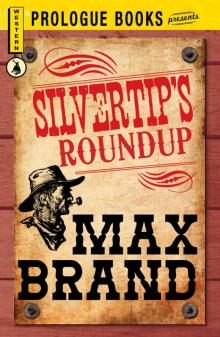 Silvertip's Roundup
Silvertip's Roundup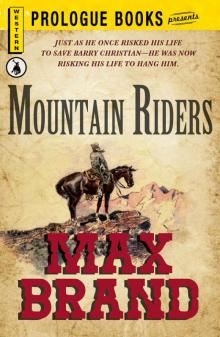 Mountain Riders
Mountain Riders Silvertip (1942)
Silvertip (1942)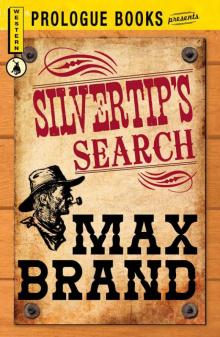 Silvertip's Search
Silvertip's Search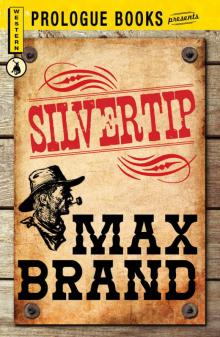 Silvertip
Silvertip Bull Hunter
Bull Hunter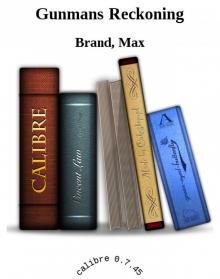 Gunmans Reckoning
Gunmans Reckoning The Seventh Man
The Seventh Man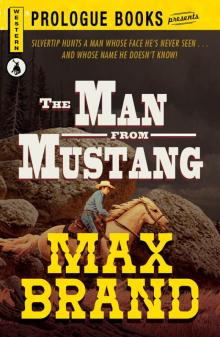 Man From Mustang
Man From Mustang Riders of the Silences
Riders of the Silences Black Jack (1922)
Black Jack (1922) Way of the Lawless
Way of the Lawless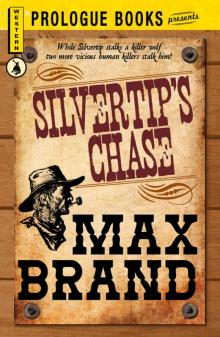 Silvertip's Chase
Silvertip's Chase Trailin
Trailin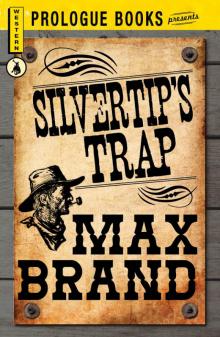 Silvertip's Trap
Silvertip's Trap Ronicky Doone (1921)
Ronicky Doone (1921) The Night Horseman
The Night Horseman the Garden Of Eden (1963)
the Garden Of Eden (1963)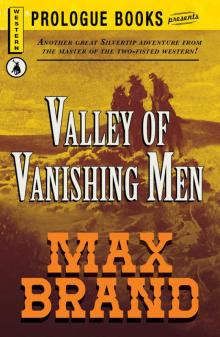 Valley of the Vanishing Men
Valley of the Vanishing Men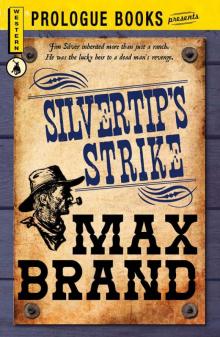 Silvertip's Strike
Silvertip's Strike Black Jack
Black Jack the Untamed (1919)
the Untamed (1919) Way Of the Lawless (1921)
Way Of the Lawless (1921) The Untamed
The Untamed